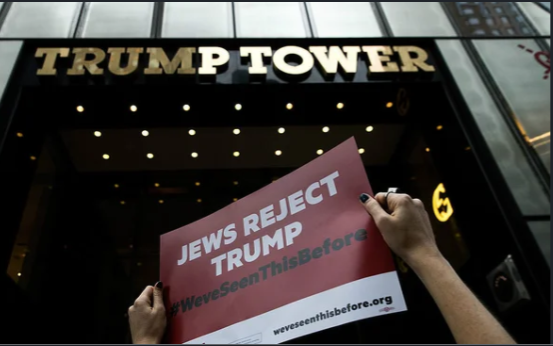The Jewish Daily Forward
President-elect Donald Trump outlined his vision for achieving peace in the Middle East – including his stance on the possible annexation of the occupied West Bank – during a wide-ranging interview with Time magazine published after being named Person of the Year. During the presidential election, Trump promised to bring stability to the region, pledging to end the ongoing war in Gaza while further isolating Iran.
In the interview published on Thursday, Trump avoided taking a clear stance on whether he supports a two-state solution as part of post-war peace efforts. ‘I support whatever solution we can do to get peace,’ he said. ‘I want a long-lasting peace, a peace where we don’t have an October 7 in another three years. And there are numerous ways you can do it. You can do it two-state, but there are numerous ways it can be done.’
Trump’s views on Israeli settlements
Trump’s first term was marked by a series of bold pro-Israel moves, including relocating the U.S. embassy to Jerusalem and recognizing Israeli sovereignty over the Golan Heights. His ambitious 2020 peace plan to solve the Israeli-Palestinian conflict was ultimately set aside in favor of the Abraham Accords, which established normalized relations between Israel and four Arab nations.
Trump’s national security picks are steadfast Israel supporters, some of whom have denied the existence of the Palestinian people and back the annexation of the occupied West Bank. Mike Huckabee, Trump’s designated ambassador to Israel, is a staunch supporter of Israeli settlements and annexation of the West Bank.
However, Trump sidestepped direct questions about whether he would support annexation, which would complicate efforts to address Palestinian demands in any future negotiations. ‘What I want is a deal where there’s going to be peace and where the killing stops,’ Trump told Time.
When pressed on whether he would allow Israeli Prime Minister Benjamin Netanyahu to annex Israeli settlements in the West Bank, a move Trump blocked during his first term, he remained noncommittal. ‘We’ll see what happens,’ he said.
Trump’s plan to end the war in Gaza
In his extensive remarks about the Middle East, Trump described the 14-month-long war in Gaza as ‘easier to solve’ than the Russia-Ukraine war, despite its complexity. ‘We’re going to sit down in a period of time, hopefully soon,’ he said. ‘There are some very productive things happening.’
His Middle East envoy Steven Witkoff during a visit to the region this week said it would ‘not be a pretty day’ if the hostages held in Gaza were not released in the coming weeks. Trump himself, earlier this month, promised ‘all hell to pay’ if the hostages are not released.
White House national security adviser Jake Sullivan, who met with Netanyahu on Thursday, told reporters he’s optimistic that a deal can be finalized this month. ‘I got the sense from the prime minister he is ready to do a deal,’ Sullivan said at a press conference in Jerusalem.
Relationship with Netanyahu
Trump soured on Netanyahu during his first term as president. Following the election of Joe Biden in 2020, Trump used profane remarks to describe his feelings about the longtime Israeli prime minister’s outreach to Biden while Trump was still contesting the results.
The pair claim to have reset their relationship in the past year. In July, after an attempt on his life, Trump shared on his Truth Social platform a video of Netanyahu condemning the assassination that injured the former president and killed a bystander. And Netanyahu has spoken to Trump seven times in recent weeks. Netanyahu is reportedly considering traveling to the U.S. next month to attend Trump’s inauguration.
In the Time interview, when asked about reports that he urged Netanyahu to end the war in Gaza before he’s sworn in for a second term on Jan. 20, Trump said the Israeli leader knows he’s serious about wanting to see an end to the conflict. ‘I don’t want people from either side killed,’ he said, ‘whether it’s the Palestinians or the Israelis.’
Yet, Trump refused to say if he trusts Netanyahu. ‘I don’t trust anybody,’ he said.
Trump on Iran
Trump’s promise to end wars aligns with his broader skepticism toward extensive U.S. military engagements overseas.
At the same time, Trump has adopted a more confrontational stance towards Iran, focusing on countering its aggression and nuclear ambitions. His senior national security team backs U.S. military action or granting Israel the go-ahead to strike Tehran if necessary.
‘Anything can happen,’ Trump said when asked about the chances of going to war with Iran during his second term. ‘Anything can happen. It’s a very volatile situation.’
